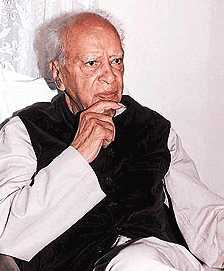When Mulk Raj changed the story
RK Malhotra
The way I introduced Dr Mulk Raj Anand to students of literature and their mentors from all over Haryana in a hall packed to capacity in November 1994 made it clear to one and all, including the novelist himself, that I had mastered every word of his major writings, especially Untouchable, Coolie, Two Leaves and a Bud, and the series popularly known as Seven Ages of Man. So, when I started presenting my story — Bravo! The Young Fighters — Anand was, like everybody else in the hall, all ears, fondly taking in every twist and turn of my voice, concentrating upon every word. The narrative had a catching start. The Nilo river was in spate and the waters were gushing out to nearby villages, especially the two Sham Nagars, old and new — one on the right side of the road and the other on the left — the former with all its temples, mosques, gurdwaras and chapels, and the latter with its schools, post office, bus stand, hospitals and market places.
Anand took note of whatever I poured out — the way people in the former rushed to their respective places of worship and offered humble prayers for their safety and survival; and the latter coming out of their houses as usual, making hefty plans, catching hold of buckets, baskets and spades, whatever was available… even youngsters helping in every possible way. The elderly ones, even those bent and broken, showing them the way in the dark with torches and lanterns. Women cooking food at home and sending out to those at work. Almost everyone was on their toes and knees to be of service. Anand was deeply absorbed in the narrative.
And within 20 minutes, I was heading towards the last paragraph, the closing part of the narrative.
At last the day dawned… and the young fighters were happy to have saved their side of the road, the fields, the houses.... But old Sham Nagar was in knee-deep waters; the houses inundated. Cries and sighs were all around.
The master’s face suddenly lost its glow. He did not relish it perhaps. He got up from his seat, came to the mike and said: ‘Why? Why like this? Why not give the story a better close? That people in both villages were equally glad to see the happy dawn, the former attributing their safety to their personal efforts… to their self-help and courage; and the latter to the grace of God… their Ram, their Rahim, their Waheguru and their Christ?’
I readily agreed to accept the suggestion that changed the very theme of the story. The magic touch of the master reminded me of what Gandhi had once done to Anand’s own Untouchable, advising him to rewrite it, showing Bakha as a victim of centuries-old injustice and not the aggressive hero shooting back in heavy stroke! The master’s one word was masterful indeed. And changed the story into a thing of beauty and a joy forever.










